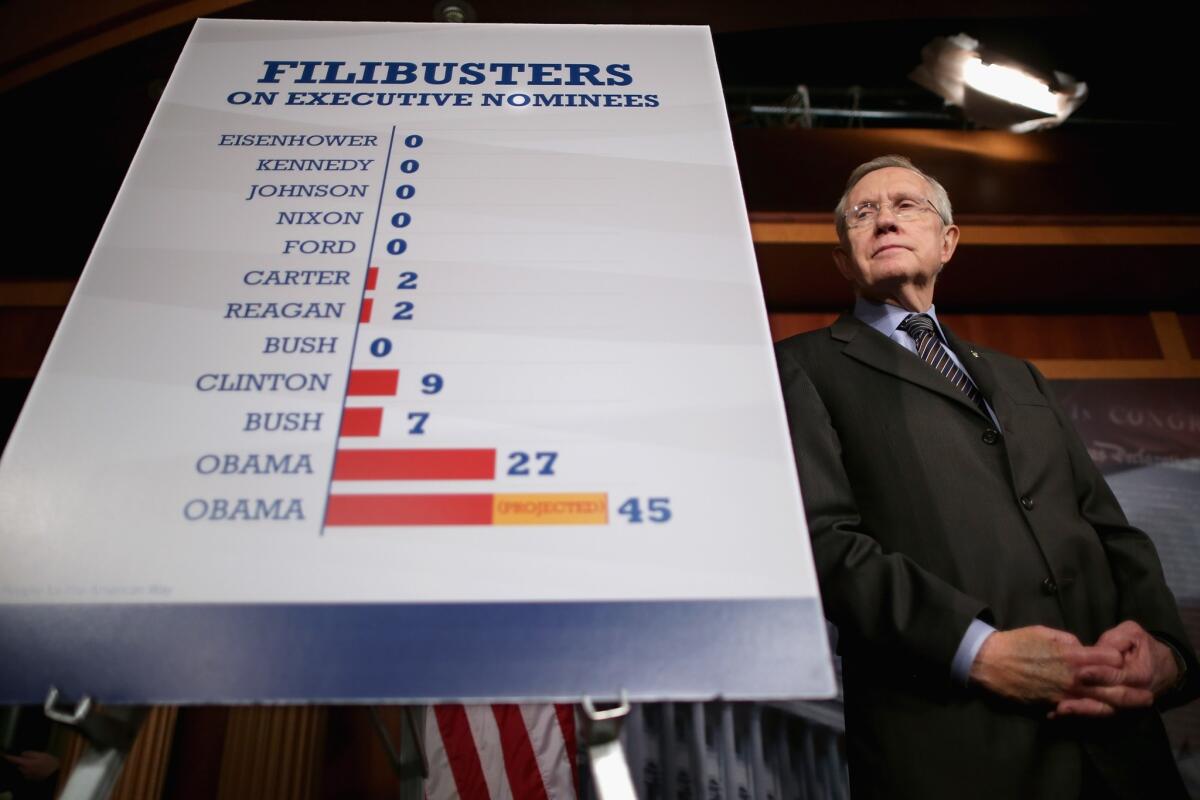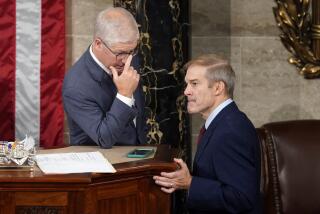Senate’s long weekends may be first filibuster fight casualty

WASHINGTON — The first casualty of the Senate’s post-nuclear era may be the long weekend.
After Senate Democrats made a historic change to the Senate’s filibuster rules, requiring only a majority vote instead of a three-fifths threshold to advance most nominations, Republicans vowed that there would be consequences.
But in the short term, there is little the minority party can do to stop the Democratic majority from voting to confirm a dozen or more long-stalled nominations between now and the end of the year, as Majority Leader Harry Reid (D-Nev.) has set out to do.
PHOTOS: 2013’s memorable political moments
What they can do, however, is string out the process to make it as time-consuming as possible, leaving Congress’ upper house unable to consider any other business.
That’s prompted Reid to make a counter-threat: if Republicans won’t tighten the process, he will hold the Senate in session for late nights, and even the weekend to get all the nominations through.
“I know that I come to this floor and say a lot of times we’re going to have to work weekends,” he said Monday. ”But we may really have to work the next couple weekends.”
For senators accustomed to a week that doesn’t begin until Monday night and often wraps up by Thursday afternoon, that amounts to a real hardship.
Some background: while the Senate lowered the threshold to cut off a filibuster, the chamber’s rules still can require an initial procedural vote before the final confirmation vote. And when that procedural hurdle is overcome, even at the easier-to-reach 51-vote level, further Senate rules require up to 30 hours of debate before that final vote.
As a courtesy, both parties often come to informal agreements to waive some, or all, of that time. Republicans now are in no mood for such courtesies.
Sen. Roy Blunt (R-Mo.), leaving Republicans’ closed-door luncheon Tuesday at which the subject was discussed, said that if Reid insists on pressing ahead with nomination votes, “it’s totally reasonable” that Republicans insist on using the full time for debate.
“He’s decided that his priority for this week are those nominations,” Blunt said. So, “some time beyond 8 to 5, three days a week should be taken to get those nominations out.”
A handful of senators are already scheduled to attend an event in Texas on Friday. Sen. Mark Begich (D-Alaska), said he was glad he was already scheduled to remain in Washington this weekend, lest he have to jet across the continent twice in an even shorter time frame than usual, if he were to go home at all.
PHOTOS: White House holiday cards through the years
Reid’s threat escalated Tuesday night after the Senate moved a step closer to confirming Nina Pillard, a second nominee to the D.C. Circuit Court of Appeals that Republicans had previously blocked. Under the 30-hour rule, the Senate cannot vote to confirm Pillard until 1 a.m. Thursday morning at the earliest. Reid said he would call the vote for that late hour if he had to. The flip side of the late night: the Senate won’t start its Wednesday session until the afternoon.
Republicans have not yet settled on other ways they might seek to complicate matters in the Senate after the Democrats’ nuclear move. But another tactic surfaced Tuesday, when Democrats were forced to cut short the confirmation hearing for Obama’s nominee to be the next IRS commissioner after a senator, anonymously, objected to waiving an obscure rule that prohibits committees from meeting for longer than two hours after the full Senate has been in session.
A real test of the temporal trench warfare will come next week, when the confirmation marathon would be interrupted so senators can consider Tuesday’s announced budget agreement, assuming that it passes the House on Friday. Then, lawmakers will be anxiously eying the coming Christmas holiday — the first such break in years where Congress has not faced an immediate fiscal or legislative deadline.
Twitter: @mikememoli
More to Read
Start your day right
Sign up for Essential California for news, features and recommendations from the L.A. Times and beyond in your inbox six days a week.
You may occasionally receive promotional content from the Los Angeles Times.







